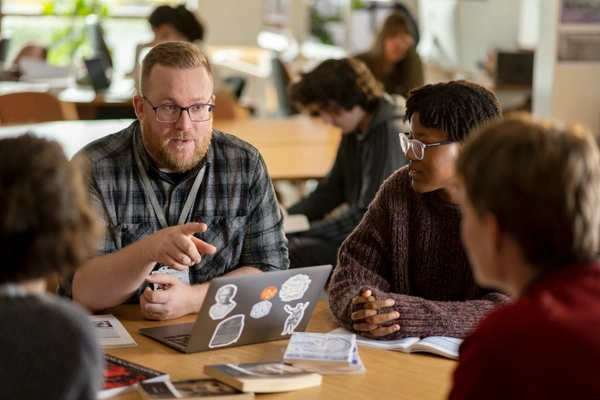Sociology
Unlocking society's secrets
At RIC, diving into sociology is like getting a backstage pass to the workings of society. It's all about understanding the nuts and bolts of how we live together, from the unspoken social norms and values that keep us in check to the quirky customs that make each culture unique. We explore why we often conform to societal expectations and what happens when someone steps out of line.
One of the big-ticket topics is inequality. We'll unpack the reasons behind the gaps in wealth, power, and opportunities among different groups. Education is a huge part of this puzzle, and we’ll see how schools can either bridge or widen these divides.
Media plays a starring role in our lives, shaping what we think and believe. In our classes, we’ll dissect how it influences everything from fashion trends to political opinions. When it comes to crime and deviance, things get really intriguing. We’ll dig into why people break the rules and how society reacts to those who do. This naturally leads us to surveillance – think Big Brother watching over us – and the ever-growing ways our actions are monitored in today's high-tech world.
Then there's the nitty-gritty of punishment and prisons. We'll explore different ways societies handle crime and what these methods say about our sense of justice and fairness.
Sociology isn’t just a subject – it's a lens through which we see and understand the world. It's about questioning, debating, and really getting to grips with what makes society tick.
The more you can increase fear of drugs and crime, welfare mothers, immigrants and aliens, the more you control all the people.

Exam Specification
Assessment method: 100% examination
Length of exams: 3 x 2 hours
Paper One: Education with Theory and Methods:
Divided into three sections, Education, with a short answer question and extended essay; an extended essay on Methods in Context; an extended essay on Theory and Methods
Paper Two: Topics in Sociology:
The topics offered will depend on who is teaching the course but should include Culture and Identity or Families and Households as option 1 and Beliefs in Society or The Media as option 2. The paper is divided into two sections corresponding to the two sets of options. Candidates will be required to write an extended essay from each section.
Paper Three: Crime and Deviance with Theory and Methods:
This paper will require candidates to produce a short answer and write an extended essay on Crime and Deviance plus an extended piece of writing on Theory and Methods.
Topic Content
Education:
The role and purpose of education, including vocational education and training, in contemporary society. Differential educational achievement of social groups by social class, gender and ethnicity in contemporary society. Relationships and processes within schools, with particular reference to teacher/pupil relationships, pupil subcultures, the hidden curriculum, and the organisation of teaching and learning.
Sociological Methods:
Quantitative and qualitative methods of research; their strengths and limitations; research design. Sources of data, including questionnaires, interviews, participant and non‐participant observation, experiments, documents, and official statistics; the strengths and limitations of these sources. The relationship between positivism, interpretivism and sociological methods; the nature of ‘social facts’
Families and Households:
The relationship of the family to the social structure and social change, with particular reference to the economy and to state policies. The nature and extent of changes within the family, with reference to gender roles, domestic labour and power relationships. The nature of childhood, and changes in the status of children in the family and society.
Beliefs in Society:
Different theories of ideology, science and religion, including both Christian and non‐Christian religious traditions. Religious organisations, including cults, sects, denominations, churches and New Age movements, and their relationship to religious and spiritual belief and practice. The significance of religion and religiosity in the contemporary world, including the nature and extent of secularisation in a global context.
Crime and Deviance:
Different theories of crime, deviance, social order and social control. The social distribution of crime and deviance by age, ethnicity, gender, locality and social class, including recent patterns and trends in crime. Globalisation and crime in contemporary society; the mass media and crime; green crime; humanrights and state crimes. Crime control, prevention and punishment, victims, and the role of the criminal justice system and other agencies.
Sociological Theory:
Consensus, conflict, structural and social action theories. The concepts of modernity and post‐modernity in relation to sociological theory. The nature of science and the extent to which sociology can be regarded as scientific. The relationship between theory and methods. Debates about subjectivity, objectivity and value freedom. The relationship between sociology and social policy.
Curious about Sociology?
Read
What do Sociologists do?
https://www.britsoc.co.uk/what-is-sociology/what-do-sociologists-do/
Individualism – what is it?
https://www.britannica.com/topic/individualism
Individualism in Japan
https://www.frontiersin.org/articles/10.3389/fpsyg.2014.00135/full
Surveillance: an extract from Michel Foucault’s book Discipline and Punish: The Birth of Modern Prison
https://muse.jhu.edu/article/252435/pdf
Thinking Sociologically by Zygmunt Bauman (extract)
https://www.researchgate.net/publication/330092960_THINKING_SOCIOLOGICALLY_3rd_Edition
Watch
What is Capitalism? (Part 1)
https://www.youtube.com/watch?v=PjctCS1kZp4
What is Marxism?
https://www.youtube.com/watch?v=fSQgCy_iIcc
Capitalism: History of Ideas
https://www.youtube.com/watch?v=dIuaW9YWqEU
Labelling theory (general)
https://www.youtube.com/watch?v=QHSvZZ1pnm0
What is deviance?
https://www.youtube.com/watch?v=B7viXDqISLc
Cyber crimes - intro
https://www.youtube.com/watch?v=mCt2hzpyWZc&t=4s
Cyber crime in the UK
https://www.youtube.com/watch?v=8NAbV6w-KUQ
Crime: ‘Honour killings’
https://www.youtube.com/watch?v=pCq2HgNk7Zs
Research
Individual versus Collectivism
Study: (an online course - free!)
https://www.futurelearn.com/courses/develop-cultural-intelligence/0/steps/49772